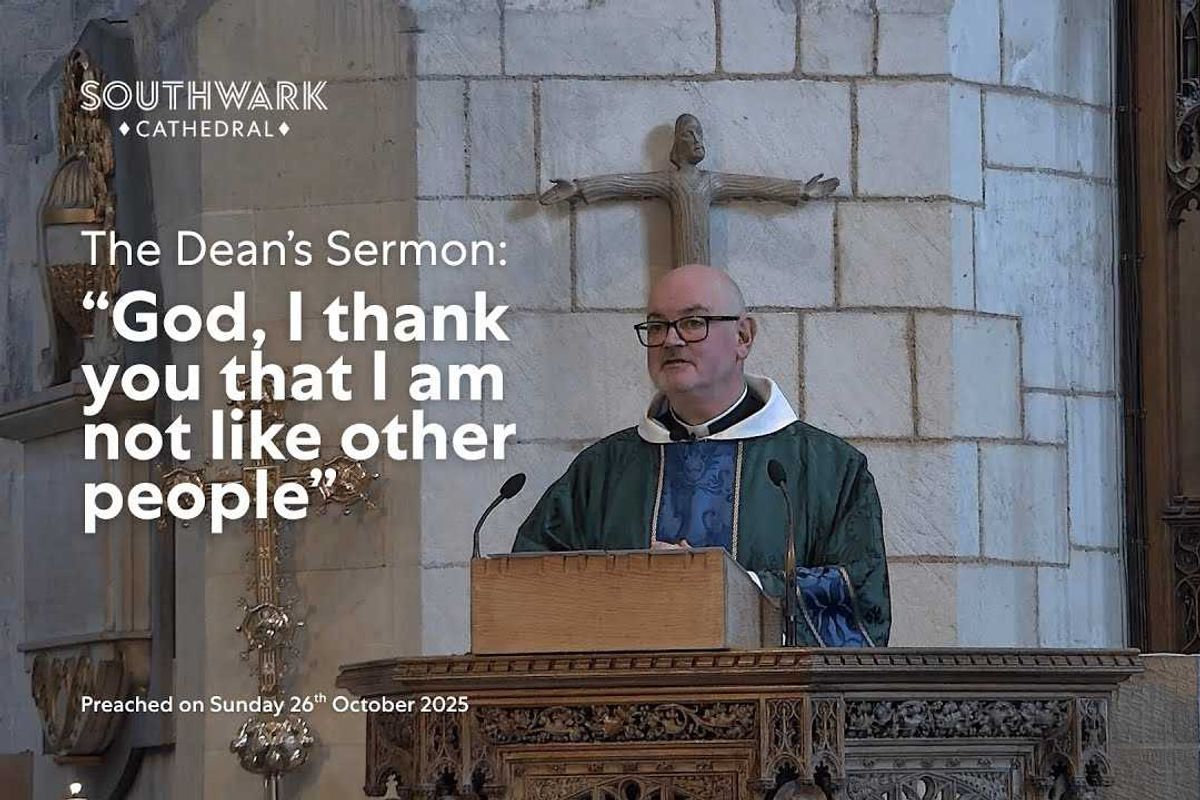'Because of God, love wins': Gay priest gives powerful sermon about authenticity of LGBTQ love
He spoke out after the church would not let him marry.
The Very Reverend Dr. Mark Oakley, a gay priest serving at Southwark Cathedral.
The Church of England has been deeply divided in recent years over whether to perform same-sex marriages, which were made legal in England in 2014. In 2023, a compromise of sorts was made when priests were allowed to offer blessings or prayers of thanksgiving and dedication to same-sex couples, which stopped short of being an official church wedding ceremony.
On October 15, however, the Church of England announced that it had paused plans to hold blessing services and that clergy members would not be permitted to marry their partners. This move was seen as a step backwards for LGBTQ equality in the church, and it inspired a passionate sermon from The Very Reverend Dr. Mark Oakley, a gay priest serving at Southwark Cathedral.
In his sermon, Oakley pushed back against the idea that LGBTQ love was separate from God's love and said that to live a life of true faith, one should have the integrity to be their true self.
- YouTube youtu.be
Oakley said his understanding of the power of integrity began when he was 18 and came out to his grandmother. “I’ve only been worried about one thing, Mark. I’ve just worried you would never feel able to tell me,” his grandmother said. “I came to see that my grandmother’s response was the response of love, and therefore it is also the response of God. God wants us to share with him who we really are, and to know that God’s love only overflows and never diminishes when we dare to do this.”
The Church of England often quotes the apostle Paul when discussing LGBTQ rights, using it as a basis for the church’s anti-same-sex-marriage stance. “For this reason, God gave them up to degrading passions. Their women exchanged natural intercourse for unnatural" (Romans 1:26).
However, Oakley argued that the world has changed drastically since Paul’s day and that, in today’s world, he would have a very different view of the LGBTQ community.
“Paul was not in the 21st century," Oakley said. "He would never meet men or women who set home up together, cooked with each other, went on holiday together; caring for each other, growing old together, being there for better or worse, and feeling a painful absence in their life when death separated them."
C of E Liberals Outraged by Same-Sex Blessings Decision https://t.co/Kw70mBNsUQ via @The Living Church
— Mark Cappetta (@mbavecusa) November 11, 2025
Oakley concluded his speech, driving home the point that love comes directly from God, manifests in countless ways, and that we should be thankful for this blessing.
“Because of God, love wins," Oakley said. "No matter what can be said or done to control or stop it, no matter how fancy the theology is to disguise a prejudice. Love comes in many shapes and many sizes, and for that and for all the diversity of all the people in the church and beyond, thanks be to God."
At the sermon’s conclusion, the congregants gave him a standing ovation.
“The Church of England has announced the appointment of Sarah Mullally as the 106th Archbishop of Canterbury. I had anticipated her appointment since the Church’s General Synod of February 2023, when Mullally led the motion to allow blessings for same-sex couples—a move strongly… https://t.co/0nujA79MCd
— First Things (@firstthingsmag) October 8, 2025
The push for LGBTQ equality in the Church of England may have been stalled, but that doesn’t mean the movement is over. The decision has pushed some priests to go rogue and perform blessings for same-sex couples outside of church doctrine.
The Rev. Simon Butler says that to refuse a blessing to same-sex couples contradicts his role as a vicar. “The pastoral task laid upon me by my ordination vows and the mission of God in this community is more important than allowing an illegitimate request from the House of Bishops to get in the way,” Butler wrote.

